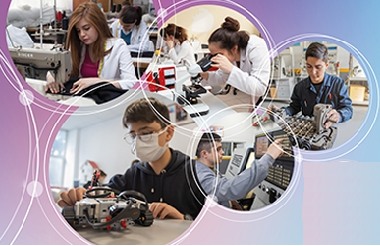
ABOUT THE PROJECT
“No One Stays Behind” refers to the basis of project. Because, with its activities and expected results, what is intended is that through informal and non-formal learning (and even when associated with formal curricula), motivation for learning is promoted, consequently improving competences, skills and attitudes of youngsters in Vocational Education and Training (VET) education, especially in NSB target groups – learners coming from socio-economic disadvantaged backgrounds.
NSB project aims to develop proposals of innovative and practical instruments, of digital nature based on the Sciences, Technologies, Engineering, Art and Mathematics (STEM/ STEAM) methodology, mostly of a non-formal nature, which will allow VET learners and teachers to develop transversal skills that will be the “empowerment” / leverage so that the process of transfer of knowledge and essential learning is carried out successfully.
The STEAM-based Summer School Workshops proposed by NSB focus activities/ materials/ forms of control and evaluation based on everyday situations that youngsters will have to respond to, to solve, to intervene and to investigate.
This Evaluation Platform allows to measure the usability of all NSB results produced in the project, to be used by VET teachers interested in applying such results with their students and young people who are not in Education, Employment or Training (NEETS), contributing for the decrease in the school dropout phenomena.

PRIORITIES:
The title “No One Stays Behind” refers to the basis of the project. NSB intends to promote through informal and non-formal learning (even when associated with formal curricula) motivation for learning and, consequently, improvement of skills, competences and attitudes of young people in VET education, especially target groups with fewer opportunities.
This purpose ultimately allows NSB TO promote sustainable growth, ensuring equality and social inclusion, through activities / instruments capable of filling gaps (educational difficulties, often associated with personal circumstances, among others) that these youngsters demonstrate in the acquisition of knowledge during the course of the education and training system and that, many times, leads to the premature school dropout.
It is intended, therefore, to reduce the number of so-called NEET, encourage entrepreneurial attitudes, as well as create innovative pedagogies that will make vocational education more attractive and encourage changes in traditional curricula through the increase of digital skills, both for VET teachers / trainers / technicians, and for young people in their vocational options, promoting new inclusive training practices and methodologies, and promoting skills on students and teachers that lead to the internationalization of vocational education.
